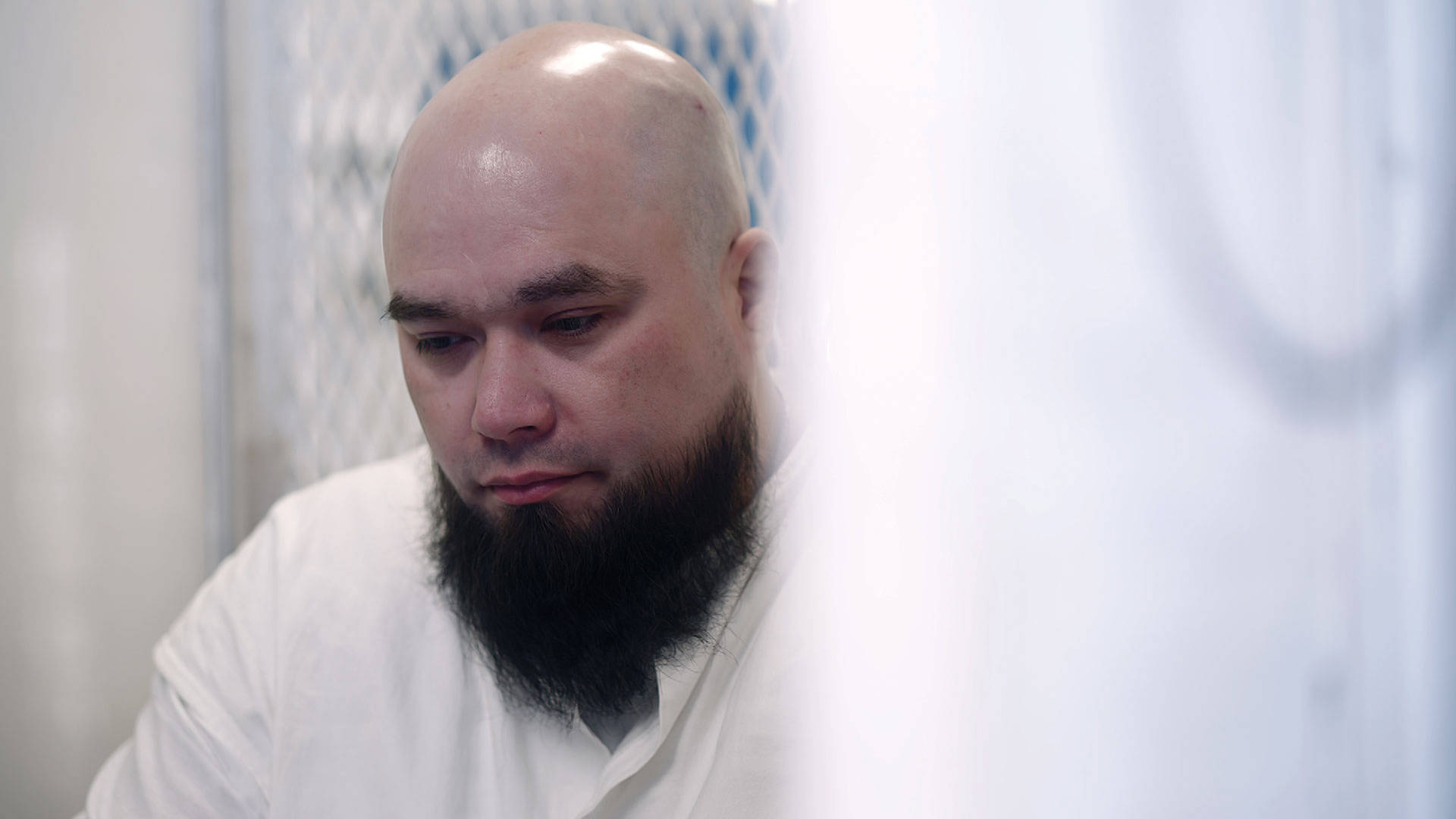This is a rush transcript. Copy may not be in its final form.
AMY GOODMAN: This is Democracy Now!, democracynow.org, The War and Peace Report. I’m Amy Goodman, with Juan González.
We look now at a short new documentary about the death penalty that began when a Texas man asked journalist Keri Blakinger to witness his execution. John Henry Ramirez was a former marine who had been sentenced to die for the 2004 murder of a convenience store clerk named Pablo Castro in Corpus Christi, Texas. Ramirez at first asked for a death sentence, saying he deserved it. He admitted he committed the crime. While on death row, he became a devout Christian. He sued for the right to have his pastor lay hands on him when he was ultimately executed in 2022.
I Am Ready, Warden examines the forces of redemption and vengeance by following Ramirez, as well as the son of his victim, Aaron Castro, and Ramirez’s own son Izzy and his supporters. It premiered Friday on Paramount+ and is directed by Smriti Mundhra. This is the trailer.
JOHN HENRY RAMIREZ: We each have our own free will. I’ll never be able to make amends for taking a life. I’m a murderer. I’ll never overcome it.
AARON CASTRO: I was 14. I remember waking up to police sirens and lights and seeing my father’s body on the ground.
JAN TRUJILLO: This man stabbed somebody 29 times.
REPORTER: The Texas Board of Pardons and Paroles unanimously denied clemency for John Henry Ramirez.
MARK GONZALEZ: In the interest of justice, our office shouldn’t be involved in murdering Texas citizens.
JOHN HENRY RAMIREZ: I just had all the anger and hate in the world.
IZZY RAMIREZ: He always said I’m going to be a better father than my dad.
JOHN HENRY RAMIREZ: I don’t think if I would have stayed free, you would have grew up to be who you are right now.
JAN TRUJILLO: John asked me, “Would you be my godmother?” He is just not that person he was then.
AARON CASTRO: Due process was done. Now we’re changing our moral judgment?
JAN TRUJILLO: “What will you gain if I die, if I sink into the grave?”
AARON CASTRO: You’re going to just forgive, and that’s it? He should pay for what he did.
JOHN HENRY RAMIREZ: I made the most changes I could. I bettered myself as much as I could, and that’s enough.
IZZY RAMIREZ: I love you.
AMY GOODMAN: I Am Ready, Warden offers remarkable access to John Henry Ramirez, who’s interviewed on death row in the final weeks of his life. This is a clip of Ramirez.
JOHN HENRY RAMIREZ: In one of the courses in the faith-based section, you have to write a letter to your victim. And when I got to the end, I was like, “I want you to know, you made me a better person. I never meant to kill you. But because that happened, it’s made me a better person, because it’s made some vast changes in who I am.” You know? And it’s a crappy way to say it, but it’s the truth.
AMY GOODMAN: For more, we’re joined in Houston, Texas, by Keri Blakinger, investigative journalist at the L.A. Times, where she covers the L.A. Sheriff’s Department. She previously covered the criminal justice system for The Marshall Project, where her reporting on John Henry Ramirez led her to work with director Smriti Mundhra on this new short documentary, I Am Ready, Warden. She’s the author of the memoir Corrections in Ink, which details Keri’s own experience serving time in prison in upstate New York.
Keri, welcome back to Democracy Now! This documentary is stunning. It is heartbreaking. Explain how you got involved and the story of this case. The guilt or innocence has been established. John Ramirez says, “I murdered this store clerk.”
KERI BLAKINGER: Yeah. So, as you said in your intro, the way that I got involved was because he asked the spokesman if I could be the reporter who would witness his execution. I was actually at death row visiting another person for an interview for a completely unrelated story, and the spokesman pulled me aside and said, “Hey, this guy, John Ramirez, asked if you could be the person who would witness his execution.” And I was struck by that. I had never gotten that sort of request from a person on death row. And so, I said, “You know what? I will at least put in a request for an interview and see what the story is and where it takes me.”
And that ended up leading to two stories. One was about one of the legal issues that he had pending, which was whether his pastor could lay hands on him as he was being executed. And that became a national media issue. I wrote a story about that.
He also told me that he was participating in a death row radio station, which was a new initiative at that point, still going on, and it was where guys who were in general population were doing an inmate-run radio station that was low wattage and could really only be heard by other inmates on the unit. And they were allowing — the prison was allowing death row inmates to participate by writing to the guys who were running the station, and they could read their words on the air, which was really remarkable, because the guys on death row had been in solitary for over two decades at that point and had very little direct interaction with general population people. And this was a rare chance for them to share their words with the broader prison population. But it was also kind of remarkable because it was a station that was run by inmates for inmates. So, this is really a window into how they talk to each other when there’s no one from the free world listening. And I wrote a story about that.
And then, Smriti, the director, read that story and said she was fascinated by this character John Ramirez. And we ended up going down the path of just sort of talking to everyone in his life and everyone who was involved in his case and seeing where the story led us.
JUAN GONZÁLEZ: Keri, in addition to Ramirez himself, you closely followed the son of his victim, Aaron Castro. Could you talk about his struggle with vengeance and redemption?
KERI BLAKINGER: I think he is — he ends up being, I think, the character, per se, who really makes the film, because I think that people — you know, I think that the victims’ families are told that executions will bring them closure. And I think that one of the things that we were able to explore in spending so much time with him is whether that is always the case or whether that is ever the case. And I think, in his instance, we get to watch him grapple with that in some really remarkable moments on film. He was a really great person to be having on film, because you can see his emotions are just right below the surface. And I think that makes him a very evocative character, as it were. I mean, obviously, he’s a very real person who shows us some very raw moments of his life.
AMY GOODMAN: I wanted to go to another clip from I Am Ready, Warden of the county district attorney, Mark Gonzalez, who moved to withdraw the death warrant for John Henry Ramirez, again, convicted in 2004 in robbery and murder of Pablo Castro, a store clerk. Later in the clip, we also hear from Castro’s son, from Aaron. This is the DA, Gonzalez.
MARK GONZALEZ: I got with Mr. Ramirez’s attorney, Seth Kretzer. And I joined him in a motion, letting the court know why we felt the date of execution should be withdrawn. What I’m hoping is we’ll get some direction from a higher court, and they’ll say that I have all the authority to withdraw that date of execution.
SETH KOVAR: The proof is in the motion Gonzalez filed today. He’s trying to get Ramirez’s execution date withdrawn.
MARK GONZALEZ: I have, for a while now, said that I don’t believe in the death penalty, and my office is not going to seek the death penalty anymore.
SETH KOVAR: Withdrawing or keeping the execution date is in the hands of the judge for Ramirez’s trial. His attorneys have …
AARON CASTRO: You can’t get a real moment of time to heal properly. Due process was done. Now we’re changing our moral judgment? For us, the victims, we thought it was going to end with justice, right? And now, ultimately, we’re looking at possibly no execution at all.
AMY GOODMAN: Again, that was Nueces County District Attorney Gonzalez calling for the vacating of the death warrant. Keri Blakinger, if you can explain how he joined with John’s attorney?
KERI BLAKINGER: Yeah, this was such a legally interesting case. So, John Ramirez had had an execution date set in 2021, and that one got called off because of the pending legal issues over whether his pastor could lay hands on him as he was being executed. So, that issue went up to the Supreme Court. And when the Supreme Court sided with him and said, “Yes, the pastor can lay hands on you as you’re being executed,” that meant that he won that aspect of his case, but it also meant that he became eligible for an execution date again.
In the interim, the district attorney, Mark Gonzalez, had come out saying that he was no longer in support of the death penalty. However, his office still ended up asking for an execution date, and he later said that that was because one of his assistant district attorneys had asked for it routinely without consulting him and without his knowledge. So, at that point, Mark Gonzalez tried to have the date recalled, try to have it called off. And this ended up turning into a monthslong legal battle, and it turned out that the judge, the trial court judge, determined that he didn’t have jurisdiction to just cancel a date for that reason. There are specific legal reasons in Texas that you can recall a date, and the district attorney changing his mind turns out not to be one of them.
JUAN GONZÁLEZ: And, Keri, you said in a podcast that reporting this story sort of broke you. What did you mean by that? And what do you hope those who view the film take away from it?
KERI BLAKINGER: So, when I say this story broke me, that actually — the reasons for that didn’t even end up in this film at all. But it was one of the most heartbreaking things I have seen, interviewing him repeatedly over a period of months.
The first time that I interviewed John Ramirez, we talked a lot about his faith, because he had the pending appeals about his pastor. And he had this elaborate vision of an afterlife. And he was very firm in his faith, and his idea of this afterlife seemed to give him a lot of comfort when I was talking to him, which was a week before his scheduled execution date. Then that execution got called off, and I think he saw that as a confirmation of his faith in some ways.
And then, over the next few months, it ended up getting scheduled again, and then there was this protracted legal battle over whether it could be called off. And somewhere in there, I think all the back-and-forth really wore on him, and by the time that I saw him in, I don’t know, the summer before he got executed, he had — you know, he seemed to be in a much darker place.
And then, I think the last time that I saw him, he started talking about how he hoped that he was wrong and that there wasn’t this elaborate afterlife, and he just wished for blackness. And I am not a person of faith, but watching someone lose not just their life but, like, their afterlife, that just felt like one of the darkest things that I’ve seen in covering death row. So, that’s what I think about when I think about the ways in which this case has impacted or broken me.
AMY GOODMAN: And, Keri, in the last 30 seconds we have, speaking of impactful moments, when he says goodbye over the phone to his own son Izzy?
KERI BLAKINGER: Yes, that is — I mean, that is such a rare moment to be able to capture on film, and it’s obviously such a raw moment. But I think it really makes the viewer think about the sort of circles of loss and trauma that come with every death row case and every execution, because, you know, there’s no happy outcomes in this case, in this story, in this film.
AMY GOODMAN: Keri Blakinger, we thank you for being involved with, for producing this film, investigative journalist, reporter at the L.A. Times. Her reporting on John Ramirez led to her work with the the director Smriti Mundhra on the new short documentary everyone should see called I Am Ready, Warden, now streaming on Paramount+, author of the memoir Corrections in Ink: A Memoir.
That does it for our show. I’m Amy Goodman, with Juan González, for another edition of Democracy Now!, democracynow.org.











Post comments (0)